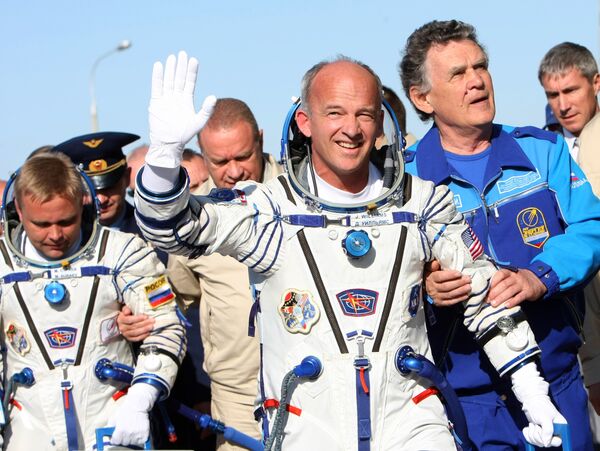KOROLYOV (Moscow Region), October 2 (RIA Novosti) - The Soyuz TMA-16 spacecraft successfully docked with the International Space Station (ISS) on Friday, a RIA Novosti correspondent reported from Russia's Mission Control Center.
Transfer hatches are due to be opened between 15:34 and 15:48 Moscow time [11:34 and 11:48 GMT].
The spacecraft lifted off on board a Soyuz-FG carrier rocket on Wednesday from the Baikonur space center in Kazakhstan. Its crew comprises U.S. astronaut Jeffrey Williams, Russian cosmonaut Maxim Surayev, and a space tourist, Canadian billionaire Guy Laliberte.
With the arrival of the Soyuz TMA-16, the ISS now hosts three Russian spaceships, including the Soyuz TMA-14 and the Soyuz TMA-15, which arrived at the orbital station on March 28 and May 29 respectively.
The ISS will be temporarily staffed by nine people. The current Expedition 20 crew comprises Russian cosmonauts Gennady Padalka and Roman Romanenko, U.S. astronauts Michael Barratt and Nicole Stott, European astronaut Frank De Winne and Canadian astronaut Robert Thirsk.
Williams and Surayev will replace Padalka and Barratt, who will return to Earth with Laliberte on October 10 having been on the space station since March. De Winne will command Expedition 21, taking over from Barratt.
The new members of the ISS crew will spend about six months in orbit and carry out a number of tasks, including the unloading of three Russian Progress space freighters and a spacewalk to install a Russian MIM-2 scientific module.
They will also conduct 48 scientific experiments and work with crews of three U.S. space shuttles, which are scheduled to arrive at the orbital station during the next six months.





